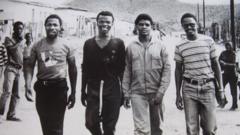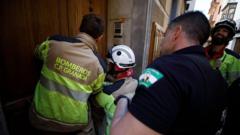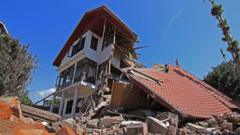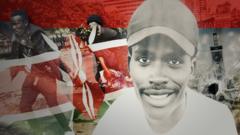Amidst public outrage, human rights organizations are pushing for accountability from security forces in Kenya after a BBC documentary highlighted their deadly response to peaceful protests.
**Calls for Accountability Intensify as Kenya Faces Backlash from BBC Investigation**

**Calls for Accountability Intensify as Kenya Faces Backlash from BBC Investigation**
Growing demands for investigation into police actions during protests against Kenya's finance bill following shocking exposé.
More than 100,000 demonstrators took to Nairobi's streets on June 25, 2024, protesting against a contentious finance bill, which aimed to raise $2.7 billion to reduce external borrowing. Following the airing of a BBC Africa Eye investigation, which implicated security forces in the unlawful killing of three protesters, there has been intensified pressure for accountability. Prominent human rights organizations, including Amnesty International and the Kenya Human Rights Commission (KHRC), are demanding that implicated officers face legal consequences for their actions.
Kenya's government responded defensively, with spokesperson Isaac Mwaura asserting that while it values every life, accusations against the security forces should be scrutinized for fairness. He criticized the BBC documentary, claiming it was biased and failed to represent the actions of the protesters adequately—specifically, incidents of vandalism during the protests.
The tension escalated in parliament, with MP John Kiarie accusing the BBC of promoting foreign interests, while MP Millie Odhiambo argued for a non-restrictive approach to media coverage, acknowledging the documentary's powerful impact on public sentiment. Amid criticisms of governmental transparency, the BBC had sought to include government perspectives in its reporting but was met with resistance.
The BBC's report, titled "Blood Parliament," detailed the chaotic and deadly confrontations that occurred on the day lawmakers voted on the tax increases, revealing that over 5,000 images helped identify members of the security forces who had opened fire on unarmed protesters. Amnesty’s information indicated that at least 65 individuals died in the protests, while the government reported a lower death toll of 42, reflecting ongoing disputes over the events.
In a move that highlights the official backlash against dissent, the BBC was forced to cancel a private screening of its documentary in Nairobi due to governmental pressures. Despite this, the BBC made the documentary available online, inviting broader scrutiny of the events. In tandem, Amnesty International reiterated its call for a public inquiry, emphasizing that excessive lethal force had been used, a sentiment echoed by the KHRC, which labeled the security operations as deeply flawed.
As the situation unfolds, calls for accountability resonate across social media platforms, demanding that the Kenyan government address the issue of police brutality and ensure justice for victims of the protests. No officers have been charged as the Independent Policing Oversight Authority works through its investigations. The issues at hand have created a divide within the political landscape, with allegations of premeditated violence against protesters being contested from various angles.
As Kenyans continue to voice their frustrations and seek accountability, the potential for future unrest looms, calling for careful reflection on the role of security forces and the imperative of upholding human rights within the nation.



















